|

“Almost like a real web
site”
|
IN7OMM.COM
• Search |
Contact
• News |
e-News |
• Rumour Mill |
Stories
• Foreign Language
• in70mm.com auf Deutsch
WHAT'S ON IN 7OMM?
7OMM FESTIVAL
• Todd-AO Festival
• KRRR! 7OMM Seminar
• GIFF 70, Gentofte
• Oslo 7OMM Festival
• Widescreen Weekend
TODD-AO
• Premiere |
Films
• People |
Equipment
• Library |
Cinemas
• Todd-AO Projector
• Distortion Correcting
PANAVISION
• Ultra Panavision
70
• Super Panavision
70
|
 |
|
VISION, SCOPE & RAMA
1926
Natural Vision
1929 Grandeur
1930 Magnifilm
1930 Realife
1930 Vitascope
1952 Cinerama
1953
CinemaScope
1955 Todd-AO
1955 Circle Vision
360
1956
CinemaScope 55
1957 Ultra
Panavision 70
1958 Cinemiracle
1958 Kinopanorama
1959 Super
Panavision 70
1959 Super Technirama 70
1960 Smell-O-Vision
1961 Sovscope
70
1962
Cinerama 360
1962 MCS-70
1963 70mm Blow Up
1963 Circarama
1963 Circlorama
1966 Dimension 150
1966
Stereo-70
1967 DEFA 70
1967 Pik-A-Movie
1970 IMAX / Omnimax
1974 Cinema
180
1974 SENSURROUND
1976 Dolby Stereo
1984 Showscan
1984 Swissorama
1986 iWERKS
1989 ARRI 765
1990 CDS
1994 DTS / Datasat
2001
Super Dimension 70
2018 Magellan 65
•
Various Large format
| 70mm to 3-strip |
3-strip to 70mm |
Specialty Large Format |
Special Effects in 65mm |
ARC-120 |
Super Dimension 70
| Early Large Format
• 7OMM Premiere in
Chronological Order
7OMM FILM & CINEMA
• Australia |
Brazil
• Canada |
Denmark
• England |
France
• Germany |
Iran
• Mexico |
Norway
• Sweden |
Turkey
• USA
LIBRARY
• 7OMM Projectors
• People |
Eulogy
• 65mm/70mm Workshop
• The 7OMM Newsletter
• Back issue |
PDF
• Academy of the WSW
7OMM NEWS
• 2026 | 2025 | 2024
• 2023 |
2022 |
2021
• 2020 |
2019 |
2018
• 2017 |
2016 |
2015
• 2014 |
2013 |
2012
• 2011 |
2010 | 2009
• 2008 | 2007 |
2006
• 2005 | 2004 |
2003
• 2002 |
2001 |
2000
• 1999 |
1998 |
1997
• 1996 |
1995 |
1994
|
|
in70mm.com Mission:
• To record the history of the large format movies and the 70mm cinemas
as remembered by the people who worked with the films. Both during
making and during running the films in projection rooms and as the
audience, looking at the curved screen.
•
in70mm.com, a unique internet based magazine, with articles about 70mm
cinemas, 70mm people, 70mm films, 70mm sound, 70mm film credits, 70mm
history and 70mm technology. Readers and fans of 70mm are always welcome
to contribute.
•
Disclaimer |
Updates
• Support us
• Testimonials
• Table of Content
|
| |
| |
Extracts and longer
parts of in70mm.com may be reprinted with the written permission from
the editor.
Copyright © 1800 - 2070. All rights reserved.
Visit biografmuseet.dk about Danish cinemas

|
| | The Lost Dominion 70mm Film Festival
Sept. 24-26th 2010, Museum of Civilization, Gatineau, Quebec | Read more at
in70mm.com
The 70mm Newsletter
| | Written by: Paul Gordon, member of the Lost Dominion Screening Collective, Ottawa, Ontario, Canada | Date: 22.02.2010
+ Updated
21-01-2024 | Festival program, Tickets and details (times and films are subject to change) | |
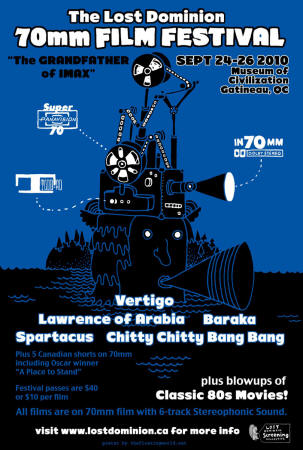 Click
Festival poster, to see enlargement Click
Festival poster, to see enlargement
The Lost Dominion Screening Collective is proud to present the first annual 70mm Film Festival at the Canadian Museum of Civilization on September the 24th, 25th, and 26th, 2010.
The Canadian Museum of Civilization is Canada's most popular museum, receiving over 1.4 million visitors per year. The institution is over 150 years old and is home to many of the most important historical artifacts of Canada. Since its move from downtown Ottawa across the Ottawa River to Gatineau, Quebec in the late 1980's, the museum has been famous for occupying one of the most scenic tourist sites in Canada - directly across the river from Parliament Hill. The “new” museum building, designed by renowned architect Douglas Cardinal, has played a prominent role in the cultural and political life of Canada since its opening. Its Grand Hall has been the dramatic location of many state dinners for everyone from the President of the United States to the Prince of Wales, and the museum as a whole has received more visitors than any other museum in Canada. The building features dramatic contours reminiscent of the Canadian landscape and was designed to tell the epic story of Canada, a history stretching back for 20 000 years of continuous human habitation.
No better building could be found in which to celebrate the most epic film format of the 20th Century: 70mm film. We will be showing a selection of popular films of the 20th Century in 70mm format, as well as some Canadian 70mm film prints that haven't been seen on the big screen since the late 1960's and early 1970's. These will include Christopher Chapman's Oscar-winning short film “A Place to Stand”.
The Lost Dominion Screening Collective is a newly-formed arts collective whose members include film professionals (writers, directors and conservators), enthusiasts, and students based in Ottawa, Canada. Most of its members were involved in the 2008/2009 preservation and revival of the Mayfair Theatre, Ottawa's oldest movie theatre and a newly-designated heritage building built in the Mediterranean "atmospheric cinema" style.
| More in 70mm reading:
"Lawrence of Arabia"
"Spartacus"
"Baraka"
I love the smell of mag in the morning!
Festival Report from The Lost Dominion 70mm Film Festival
Internet link:
civilization.ca
lostdominion.ca
facebook
National Film Board of Canada
ottawafestivals.ca
City of Ottawa
Ottawa Citizen
Facebook
Canadian Museum of Civilization
100 Laurier Street
Gatineau
Quebec K1A 0M8
Canada |
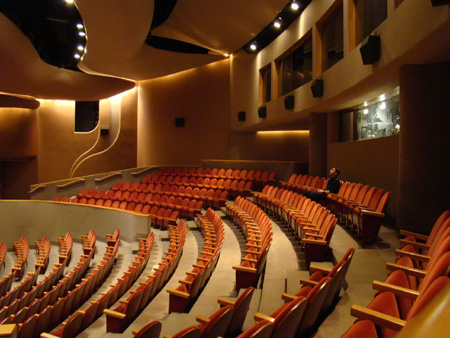 Screen 1. Image by Paul Gordon Screen 1. Image by Paul Gordon
The goal of the Lost Dominion Collective is to bring some big-screen cinema excitement to audiences in the nation's capital and surrounding areas by organizing and running new film festivals and screening series. In 2010 and 2011 we have four series of film screenings planned, including, variously: A year-long retrospective of Cult Canadian Cinema at the Mayfair; an outdoor film series at the Raven's Knoll campground; a documentary and experimental film series at Club SAW at the Arts Court building in downtown Ottawa, and the 70mm Film Festival at the Canadian Museum of Civilization.
We have planned three separate series of film screenings to be held in different venues in 2010 and 2011, with a special emphasis on Canadian films and films that are rarely-seen on the big screen. All the films will be projected on film (16/35/70mm) in their proper aspect ratio. For more on our collective go here www.lostdominion.ca.
 Robert
Harris is planning on attending the festival and will do a Q&A on large
format film restoration. Check www.lostdominion.ca
for more details in the coming weeks. Robert
Harris is planning on attending the festival and will do a Q&A on large
format film restoration. Check www.lostdominion.ca
for more details in the coming weeks.
|
For invaluable help setting this 70mm festival up, the organizers would
like to thank:
Markus Lemm Projectionist
Kirk Sayers Projectionist
Dave Callen Projectionist at Cinesphere, Ontario Place
Bill Kretzel, Short film research
Mike Hazelton, Cinesphere and Ontario Place
Francine Lapointe, Museum of Civilization
John Yemen, local promotion
Lucie Charbonneau, National Film Board of Canada
Tim Smy, MGM
Jacob Rolfe, Poster art
Quickbeam Films, 70mm trailers, posters and extra 70mm reels
Thomas Hauerslev, Web promotion with In70mm.com!
| FRIDAY, 24. September 2010 | |
 1:30pm "Vertigo". 1958,
129 mins. 35mm VistaVision. Presented in 70mm, 6-track DTS Stereo. 1:30pm "Vertigo". 1958,
129 mins. 35mm VistaVision. Presented in 70mm, 6-track DTS Stereo.
One of Hitchcock's best, Vertigo is psychological thriller that could be
described only in superlatives. But we prefer to describe it in terms of its
component pieces: James Stewart. Kim Novak. San Francisco. Bernard Herrmann.
If that's not enough for you, the photography by cinematographer Robert
Burks
(who shot twelve Hitchcock films in his “golden period” 1951-64) looks
fantastic
in 70mm. Oh yeah, and it's certainly “one of the greatest films ever made”.
| |
 4:00pm "Star Trek VI". 1991, 110mins. 35mm blow-up. Presented in 70mm, 6-track magnetic Dolby Stereo. Great print with perfect colour 4:00pm "Star Trek VI". 1991, 110mins. 35mm blow-up. Presented in 70mm, 6-track magnetic Dolby Stereo. Great print with perfect colour
One of the best Star Trek movies, directed by Nicholas Meyer, the same director as Star Trek II: Wrath of Khan. Featuring fine performances by Canadians Christopher Plummer, William Shatner, Kim Cattrall and James Doohan. Also featuring some good work from the non-Canadians in the cast, including Leonard Nimoy as Spock, and DeForest Kelley in his the final appearance as Enterprise doctor Bones McCoy. Plummer makes for one of the best Trek movie villains, and William Shatner brings out the humanity of an aging Captain Kirk. A more-than-worthy "final hurrah" for the original cast in their last big-screen adventure together. Both Shatner and Nimoy revised their roles in later films in the series, but not together, and not this satisfyingly.
| |
 7:00pm "Vertigo". 1958,
129 mins. 35mm VistaVision. Presented in 70mm, 6-track DTS Stereo. 7:00pm "Vertigo". 1958,
129 mins. 35mm VistaVision. Presented in 70mm, 6-track DTS Stereo. | |
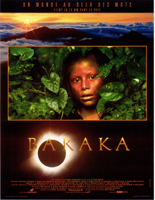 9:30pm "Baraka" (+ "A
Place to Stand" plays before feature). Filmed in 65mm Todd-AO and presented in 70mm, 6-track magnetic Dolby Stereo. This print is from the film's producer Mark Magidson 9:30pm "Baraka" (+ "A
Place to Stand" plays before feature). Filmed in 65mm Todd-AO and presented in 70mm, 6-track magnetic Dolby Stereo. This print is from the film's producer Mark Magidson
Awesome poetic documentary by director Ron Fricke, who also had a hand in bringing the world similar films Koyaanisqatsi and Chronos. Baraka features spectacular footage from around the world with a focus on the relationship between nature and human civilization. Many have compared watching the film to having a spiritual experience. We can't guarantee that you will achieve transcendence watching this film, but you will better understand the revelatory power of cinema. If you haven't seen it, or have seen it but not on the big screen, don't miss it in 70mm.
| |
SATURDAY, 25. September 2010 | |
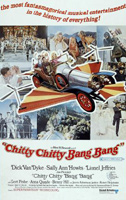 10:30am "Chitty Chitty Bang Bang". 1968, 144mins with intermission. $5.00 tickets. Filmed in 65mm Super Panavision 70 and presented in 70mm, 6-track magnetic stereo. A very clean almost mint condition print but it has major colour fade from age. Please note the tickets for this film are half price and children 16 and under are free. 10:30am "Chitty Chitty Bang Bang". 1968, 144mins with intermission. $5.00 tickets. Filmed in 65mm Super Panavision 70 and presented in 70mm, 6-track magnetic stereo. A very clean almost mint condition print but it has major colour fade from age. Please note the tickets for this film are half price and children 16 and under are free.
Chitty Chitty Bang Bang is a family classic based on James Bond creator Ian Flemming's book of the same/similar name. Famed children's author Roald Dahl appropriately helped pen the imaginative and witty screenplay for this delightful film. Dick Van Dycke and Sally Ann Howes put in fine performances shepherding children Adrian Hall and Heather Ripley through a series of fantastical adventures. Watch for appearances by Desmond Llewellyn (gadget-master "Q" from the James Bond series) as well as comedian Benny Hill. Although this print is faded, the movie magic still shines through.
| |
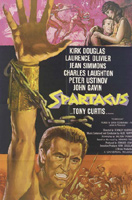 2pm "Spartacus". 1960, 198mins with intermission. Filmed in 35mm Technirama and presented in 70mm, 6-track magnetic Dolby stereo. Print Note: A nice print from the 1991 restoration 2pm "Spartacus". 1960, 198mins with intermission. Filmed in 35mm Technirama and presented in 70mm, 6-track magnetic Dolby stereo. Print Note: A nice print from the 1991 restoration
This tale of a slave revolt in the Roman Empire is one of the all-time classics. Stanley Kubrick directed it, Kirk Douglas starred in it, and Dalton Trumbo (screenwriter of Roman Holiday and Papillon) wrote it. A monumental film whose influence is still felt today (including in every "sword-and-sandals" epic made since, most notably in Ridley Scott's Gladiator). Peter Ustinov won the Academy Award for Best Supporting Actor, and the film also won the Oscar for Best Cinematography. This 70mm transfer is the best way to see the film on the big screen. Also featuring Lawrence Olivier, Jean Simmons, Charles Laughton and Tony Curtis.
| |
 7pm "Lawrence of Arabia". 1962, 227mins with intermission. Filmed in 65mm Super Panavision 70 and presented in 70mm, 6-track magnetic Dolby Stereo. A beautiful print from 1989 restoration. 7pm "Lawrence of Arabia". 1962, 227mins with intermission. Filmed in 65mm Super Panavision 70 and presented in 70mm, 6-track magnetic Dolby Stereo. A beautiful print from 1989 restoration.
If you love epics, it's hard to overstate how perfect a film Lawrence of Arabia is - so we'll just say it's great. It's even better seen projected in its original 70mm format on the big screen. Rarely has any film exploited the potential of film form and content as well as this historic epic about British World War One hero T.E. Lawrence. This film works amazingly well on both the epic and personal scales, owing much to the subtle lead performance by Peter O'Toole, the deft direction of David Lean, and the stunning 70mm photography of cinematographer Freddie Young. With Alec Guiness, Anthony Quinn, Omar Sharif, José Ferrer, and Claude Rains, and one of the best musical scores ever by Maurice Jarre, it's the definition of a movie epic. Winner of seven Academy Awards, inlcuding Best Picture for 1962.
| | SUNDAY, 26. September 2010 | |
 11am Canadian Shorts Program on 70mm: 11am Canadian Shorts Program on 70mm:
Condition note: All these short films are vintage print supplied to us from the National Film Board and the Ontario Cinesphere archive, expect colour fade and some wear.
"A Place to Stand" (1967, 18mins) 6-track mag. Winner of the Best Live Action Short Subject Oscar at the 1968 Academy Awards.
"Multiple Man/L’Homme Multiplie" (1968, 16mins) 70mm short film by the National Film Board of Canada
"Where the North Begins", 1971, 22mins, 6-track mag
"Festival" (1971, 24mins) 6-track mag
"Seasons
of the Mind" (1971, 22 min) 6-track mag
| |
 1pm "Lawrence of Arabia". 1962, 227mins with intermission. Filmed in 65mm Super Panavision 70 and presented in 70mm, 6-track magnetic Dolby Stereo. A beautiful print from 1989 restoration. 1pm "Lawrence of Arabia". 1962, 227mins with intermission. Filmed in 65mm Super Panavision 70 and presented in 70mm, 6-track magnetic Dolby Stereo. A beautiful print from 1989 restoration.
| |
 6:30pm "Baraka" (+ "Seasons
of the Mind" Plays before feature). Filmed in 65mm Todd-AO and presented in 70mm, 6-track magnetic Dolby Stereo. This print is from the films producer Mark Magidson 6:30pm "Baraka" (+ "Seasons
of the Mind" Plays before feature). Filmed in 65mm Todd-AO and presented in 70mm, 6-track magnetic Dolby Stereo. This print is from the films producer Mark Magidson
| |
9:00 pm "The Untouchables". 1987, 119mins. 35mm blow-up. Presented in 70mm, 6-track magnetic Dolby Stereo. "The Untouchables" is slightly letter boxed to preserve its scope aspect ratio
Brian DePalma, always a meticulous visual stylist, created one of the best period pieces (and most entertaining crime films) of the 1980's with this prohibition-era story of super-cop Elliot Ness (Kevin Costner) versus notorious gangster Al Capone (Robert DeNiro). Sean Connery won his first (and only) Oscar for his supporting role as Irish-American cop Jim Malone (he's so good, you never question why he speaks with a Scottish accent). Also featuring Patricia Clarkson, Andy Garcia and Charles Martin Smith (if you don't know who Charles Martin Smith is, you should).
| |
Festival pass and the Cinema | |  Screen 1. Image by Paul Gordon Screen 1. Image by Paul Gordon
Festival Passes for the 70mm film festival go on sale Wednesday (Aug. 11th
at the Invisible Cinema (Bank an Lisgar).
Passes are $40.00 and get you into all the screenings.
Invisible Cinema
319 Lisgar Street
Ottawa, ON K2P 0E1
(613) 237-0769
Open Mon-Thu Noon-9pm; Fri-Sat Noon-10pm; Sun Noon-8pm
Festival pass is $40.00 CND, or $10.00 a show
Festival passes can be bought online through PayPal. Our PayPal account is lostdominion@gmail.com. You can also mail us a check to this address:
The Lost Dominion Screening Collective
102-429 Somerset Street West
Ottawa, ON
K2P 2P5
Canada
As the date gets closer the Museum of Civilization will also be selling tickets at their box office.
The cinema is in the Museum of Civilization in Gatineau, Quebec across the Ottawa river from Ottawa the Capital of Canada.
The museum has two cinemas an IMAX 3D/Omnimax theatre that holds 300 and a 35mm/70mm theatre that holds 500.
The 70mm projectors are Cinemeccanica Victoria 8's running changeover. Sound is processed through a Dolby CP-200 cinema processor with 5 stage speakers, 10- surrounds and subs.
| | Getting to Museum of Civilization and Staying over | | 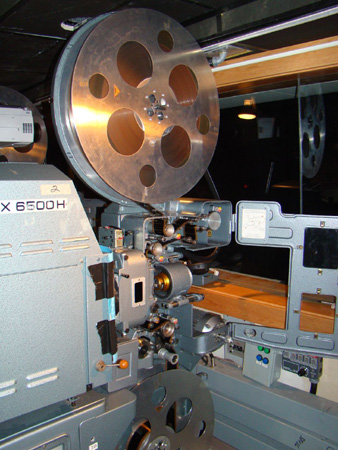 The 70mm projectors are Cinemeccanica Victoria 8's running changeover. Image by Paul Gordon The 70mm projectors are Cinemeccanica Victoria 8's running changeover. Image by Paul Gordon
Canadian Museum of Civilization
100 Laurier Street
Gatineau
Quebec K1A 0M8
Canada
How to get there
The Museum of Civilization is in the centre of the national capital region on the banks of the Ottawa River. Several restaurants, bars and hotels are within walking distance of the venue.
Including official 70mm Festival hotel:
Four Points by Sheraton
Across the street from the Museum with great views, and double rooms start
at $119 CND
also see:
Best Western Cartier Hotel
4 Jundis (a cool pub that used to show films in the summer on 35mm outside on their patio)
Les Brasseurs Du Temps (a local brew pub)
More info to come on Hotels and Resturants in the area
| | A Place to Stand | | 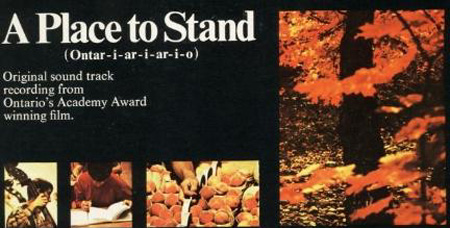 Part of the record from "A Place To Stand" Part of the record from "A Place To Stand"
A Place to Stand, 1967, 18mins, Directed by Christopher Chapman, 70mm 5 perf, 6-track mag.
"A Place to Stand" was produced and directed by Christopher Chapman for the Ontario Pavilion at Expo 67 in Montreal. The film premiered on April 28, 1967 in a 70mm print by Technicolor, on a screen 66 feet wide by 30 feet high, with six-channel stereo surround sound. Using images, music and sound effects without spoken narration or titles, the film tells about life in Ontario, presenting about an hour-and-a-half of footage in its 18-minute running time. This is accomplished by what Chapman calls his multi-dynamic image technique, a groundbreaking multiple screen, variable picture presentation that allows viewers to see many images within different panels, up to 15 scenes simultaneously on one screen.
"At Expo, "A Place to Stand" was an instant hit. It played continually before packed audiences; as many as 6000 people daily, 2 million in total," until the end of the six-month long exposition on October 27.
"A Place to Stand" - closed on 29 October 1967; originally scheduled
to close on the 27th (which was a Friday) but when it was so successful they
decided to stretch it to the Sunday. "The title song from the film became so popular a record was produced and has sold over 50,000 copies to date. Since Expo, "A Place to Stand" has been distributed to movie houses throughout Ontario and Canada and is soon to tour theatres in the U.S.A. and Europe. It is expected that over 100 million people will see the film."
Nearly every major Hollywood studio purchased prints of Chapman's film to screen for executives, producers and directors. Columbia Pictures distributed the film to movie theatres throughout the United States and Canada. "A Place to Stand" clearly influenced the composition of subsequent film images. An early prominent example of this influence was Norman Jewison's 1968 film "The Thomas Crown Affair", which featured Chapman's multi-dynamic image process in key scenes of the story. Jewison publicly acknowledged Chapman as creator of the technique.
Christopher Chapman's "A Place to Stand" was nominated in two categories for an Academy Award, including Best Documentary Short Subject. The film won in the Best Live Action Short Subject category and Chapman accepted the Oscar on April 10, 1968, during the 40th annual Academy Awards presentation at the Santa Monica Civic Auditorium. George C. Konder
| "A Place to Stand" | Multiple Man/L’Homme Multiplie | |
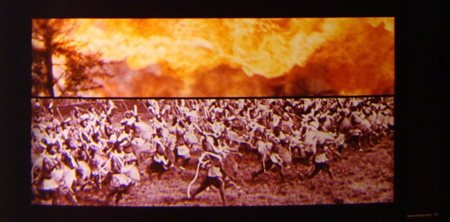 Multiple Man/L’Homme Multiplie, 1968, 16mins, directed by Georges Dufaux Multiple Man/L’Homme Multiplie, 1968, 16mins, directed by Georges Dufaux
Claude Godbout, 70mm -5 perf, 6-track mag, Produced by the National Film Board of Canada.
A many-faced view of humanity, of global man in all his forms and interests. Produced originally in 70 mm (with stereophonic sound) for showing at Man and His World, the Montréal fair that succeeded Expo 67, this film employs the multi-image technique. People of all places, origins, cultures, secular and religious, are here united and seen side by side, creating an impressive, inspiring and challenging portrait. The film's title appears in seven languages. Film without words.
| "Multiple Man" | Where the North Begins | | 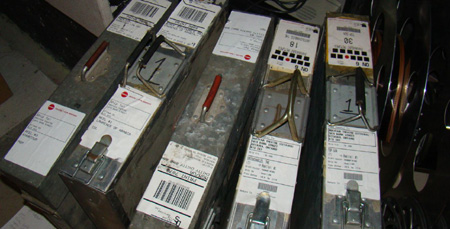 70mm transport cases. Image by Paul Gordon 70mm transport cases. Image by Paul Gordon
Where the North Begins, 1971, 22mins, Directed by David MacKay, 70mm- 5 perf, 6-track mag.
“Where the North Begins” was one of the 4 original regional portrait films commissioned for the first season of Ontario Place (the others being "North of Superior" (IMAX), "Seasons
of the Mind" (70mm), and "Home By The Waters" (35mm anamorphic). The film was directed by David MacKay who was the producer for "A Place to Stand" and then directed "Ontario-oh!". The Ontario Place Cinesphere in Toronto was the first permanent IMAX screen in the world with a screen 80ft by 60ft that still projects IMAX and 70mm-5perf films.
| | Festival | |
 Festival, 1971, 24mins, Directed by Chris Chapman, 70mm- 5 perf, 6-track mag. Festival, 1971, 24mins, Directed by Chris Chapman, 70mm- 5 perf, 6-track mag.
"Festival" is a slightly edited version of Chris Chapman's multi image "Ontario" for Expo 70 - at Osaka it ran about 30 minutes, but at Cinesphere they wanted to "turn over" the audience every half hour, so Chapman cut it back by about 6 minutes for release there in the summer of 1971 and as far as we know hasn't been seen publicly since then. It climaxes with an astounding aerial banking shot over the brink of Niagara Falls.
| | Seasons
of the Mind | |  "Seasons
of the Mind" 70mm frame blow up. "Seasons
of the Mind" 70mm frame blow up.
"Seasons of the Mind", 1971, 22 min,
co-directed by Mike Milne with Peter Pearson, 70mm- 5 perf, 6-track mag.
A portrait film of Eastern Ontario directed by Peter Pearson who’s films include the award winner’s like “The Best Damn Fiddler from Calabogie to Kaladar" (1968) and the classic Canadian feature film, "Paperback Hero" (1973). "Seasons
of the Mind" includes a talent show section set in Arnprior, Ontario.
"Seasons of the Mind" - had a co-director credit: Michael Milne (who
was Pearson's business partner and had been art director for Best Damned
Fiddler...)
| | | | | Go: back - top - back issues - news index
Updated
21-01-2024 | |
|
|